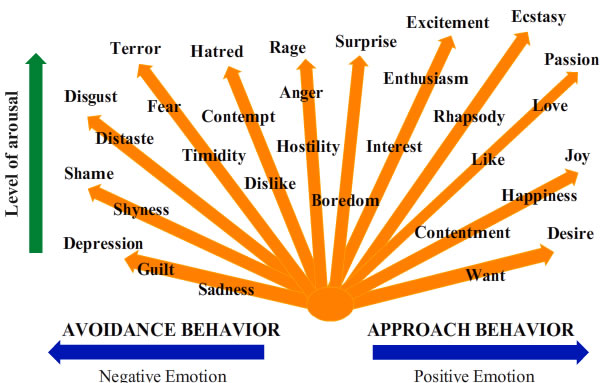Why
Although all psychology is concerned with what people do and how they do it, research on motivation and emotion focuses on why people behave as they do.
Psychologists explain motivation and emotion and why we experience it in different ways. In this lesson we will discuss theories of motivation and theories of emotion.
Instinct Theory
Instinct theory is derived from our biological make-up.
Most have seen birds in their nest feeding their babies, or building their nests to provide a "home" for their young. Most have seen spider webs or perhaps even seen them spinning a web as a place to catch their dinner. How do birds know how to build a nest or care for their young? How do spiders know how to spin a web?
The answer is biology. All creatures are born with specific innate knowledge about how to survive. Animals are born with the capacity and often the knowledge of how to survive by spinning webs, building nests, avoiding danger, and reproducing.
These innate tendencies are preprogrammed at birth, they are in our genes, and even if the bird never saw a nest before, never witnessed its creation, it would still know how to build one.
Humans have the same types of innate tendencies.
Babies are born with a unique ability to survive;
they are born with the ability to cry.
How else would we know when to feed them,
or when to change their diapers?
They are also born with several innate reflexes that you learned about earlier, such as turning their heads when touched on the cheek to suckle, or grasp an object that touches the palm of their hands.
Drive-Reduction Theory
According to Clark Hull (1943, 1952), humans have internal biological needs which motivate us to perform a certain way.
These needs, or drives, are defined by Hull as internal states of arousal or tension which must be reduced. According to the drive-reduction theory, we are driven to reduce these drives so that we may maintain a sense of internal calmness or homeostasis.
A prime example would be the internal feelings of hunger or thirst, which motivates us to eat and drink.
Incentive Theory
While the drive-reduction theory of motivation emphasizes the internal states of the organism, the incentive theory stresses the role of the environment in motivating behavior.
For example, hunger may cause us to drive to our favorite fast food restaurant but our incentive, or reward for the action, is the hamburger with fries we intend to eat.
Motives for Behavior
An example of biological and psychological motives for behavior is eating. We choose what, how much and when to eat because of both biological and psychological needs. People spend a great deal of their lives trying to satisfy both needs.
Behavioral psychologists state that some behavior is determined by the internal, or physiological, state of the organism. Like other animals, humans have certain survival needs. Our biological needs are critical to our survival and physical health.
Other psychologists have concentrated their research on psychological (social) motives rather than on biological motives. Social motives are learned from our interactions with other people.
The achievement motive concerns the desire to set challenging goals and to persist in trying to reach those goals despite obstacles, frustrations, and set-backs.
Researcher David McClelland's main tool for measuring achievement is the Thematic Apperception Test (TAT) where individuals are shown a series of pictures and they describe what is happening. Remember, that with the (TAT) there are no right or wrong answers. Critics claim that using McClelland's method is not a reliable method of testing the need for achievement.
Some Biological Needs:
- Food
- Water
- Oxygen
- Sleep
- Avoidance of Pain
Some Social Needs:
- To excel
- Social bonds
- To nourish and protect others
- To influence or control others
- Orderliness
- For fun and Relaxation

While some people may be motivated by a need for achievement others may be motivated by a fear of failure. People who are motivated by a fear of failure often make excuses to explain their poor performance.
Matina Horner (1970, 1972) identified another dimension of achievement motivation - the motive to avoid success. Some female participants in Horner's experiment were raised with the idea that being successful in all but a few careers would be odd and unlikely. Therefore, a woman who was a success in medicine or law or other traditional male occupations must be a failure as a woman.
Horner discovered that bright women, who had a very real chance of succeeding in their chosen fields, exhibited a stronger fear of success than did women who were average or slightly above average. Expecting success made them more likely to avoid it, despite the obvious advantages of a rewarding career.
The humanistic pioneer, Abraham Maslow, believed that all humans needed to feel competent, to win approval and recognition, and to sense that they have achieved something. He placed achievement motivation in context of a hierarchy of needs that all people share. Maslow's scheme incorporates all the factors we have discussed so far in this lesson and goes a step further.
Maslow's Hierarchy of Needs is pictured as a pyramid with Self-Actualization at the top and Physiological Needs at the bottom of the pyramid.
1. Self Actualization- morality, creativity, spontaneity, accceptance, experience, purpose, meaning, and inner potential
2. Self Esteem- confidence, achievement, respect of others, the need to be a unique individual
3. Love and Belonging- friendship, family, intimacy, sense of connection
4. Safety and Securtiy- health, employment, property, family, and social ability
5. Physiological needs- breathing, food, water, shelter, clothing, sleep
In Maslow's first level he asserted that people have to satisfy fundamental (biological) needs to live.
The third level in Maslow's hierarchy includes psychological needs: the need to belong and to give and receive love, and the need to acquire esteem through competence and achievement.
Self-actualization needs are at the top of Maslow's hierarchy. These may include the pursuit of knowledge and beauty or whatever else is required for the realization of one's unique potential, or "being the best you can be."
Other research does not support Maslow's conclusion that one need must be satisfied before another can be (Liebert & Spiegler, 1994). Also some people do not seem interested in fulfilling higher order needs, such as achievement. These researchers are suggesting that perhaps Maslow identified types of needs that may operate in all of us, but there is no guarantee that the needs must be satisfied in order.
The Range of Emotions
